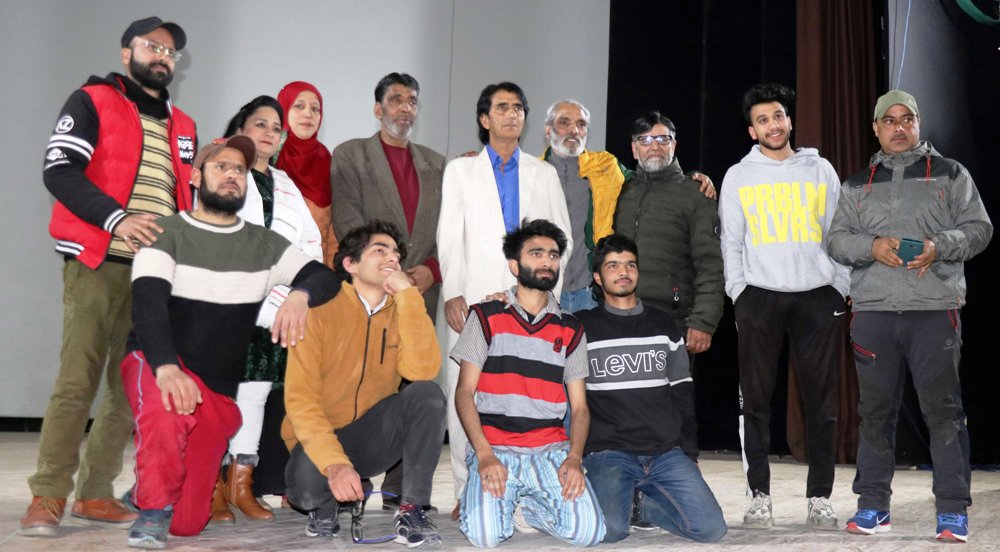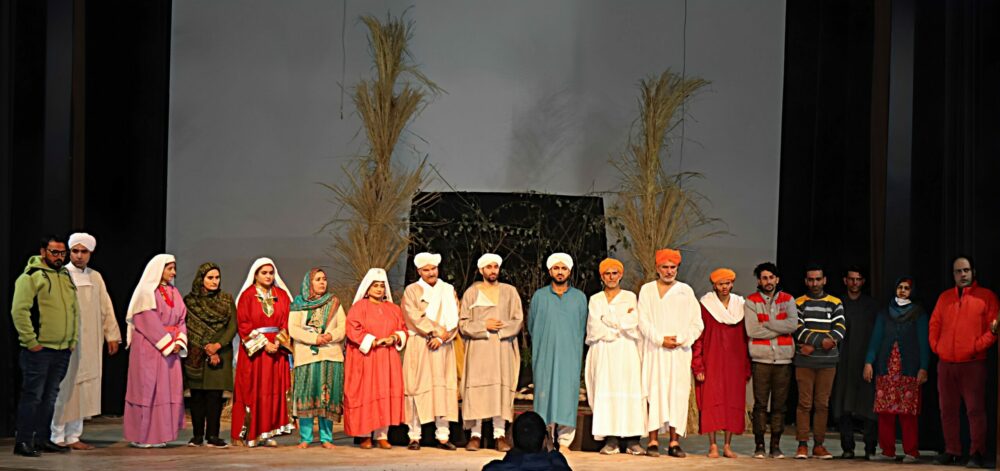[ad_1]
by Maleeha Sofi
SRINAGAR: In Kashmiri language and culture, Nam te Maaz depicts an unbreakable bond. This phrase was the title of the last play of the 8-day-long Theatre Festival Kashmir 2023.
The play showcased the relationship between Kashmir Hindus and Kashmir Muslims and their journey over years.
The play opened with a narration briefing about the living of both religions together in Kashmir until the 1990s when most of the Kashmir Hindus moved out. The narrator spoke about the brotherhood between the two and the unbreakable bond which remained unaffected after decades of separation and misunderstandings.
It narrated the story of Roop Kishan Dhar who lived in Raj Bagh. He also left Kashmir in the 1990s and Jan Sahab, a local Kashmiri Muslim took care of his home. Dhar would often visit his home even after going to Jammu and later settling in America.
The stage showed two houses, one of a Hindu and the other of a Muslim. Religious signs were used to identity the two homes.
The play starts with a conversation between Dhar and Jan Sahab. Dhar has visited Kashmir after a long time. He is seen in a Pheran, the traditional Kashmir cloak that is now being seen as part f Kashmir identity. They talk about their lives, children, and the changes that have occurred. Jan Sahab had a conversation with his wife after this where he also shares his connection with Dhar.
The next conversation is again between Jan Sahab and Dhar where they talk about the time when Dhar left Kashmir and the conflict that continued. They recounted the loss that both sides faced.

Once in a conversation, Dhar noticed a window from Jan Sahab’s house that opened into Dhar’s land. The conversation turned into verbal duelling. Jan Sahab gives a word to Dhar on fixing the issue by removing the window.
Afterward, in a monologue, Dhar talks to himself expressing his varied opinion about the matter. He seems to be confused about whether he has done right or wrong but then he convinces himself that if he would not do this Jan Sahab would gradually take over his whole land.
The play is placed at a time when the Covid19 had started beginning and impacted the lives across the world. Dhar tested positive for the virus. He was quarantined. Jan Sahab did not stop going to his place. He would still go to Dhar with meals. This was despite the fcat that his family was quite upset with this behaviour as they thought the virus could spread to them.
As Dhar recovered, he got ready to go back to America. While leaving, he expressed his gratitude to Jan Sahab and his family. He gives them gifts. Jan Sahab also reveals the truth about constructing the window from his side as it has been suggested by his father to keep an eye on Dhar’s home. Dhar realises his mistake and asks him to perish the wall separating both houses.
The play was presented by JK Cultural Revolution, written by Sohan Lal Koul, directed by Gul Riyaz, designed by Hassan Javaid, assistant direction by Showkat Magray, and set design by Mohammad Yousuf Mir and Imran Farooq. The characters were played by Qazi Faiz – Dhar, Hassan Javaid-Jan Sahab, Shafiya Maqbool – Jaan’s Wife, Aashiq Hussain- Zameer(Son), Syed Shabir Rizvi- paramedic.
[ad_2]
#Nam #Maaz #Explained #Strong #Communal #Bonds #Kashmir
( With inputs from : kashmirlife.net )




